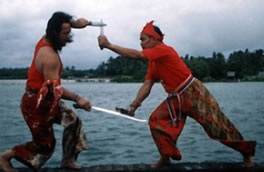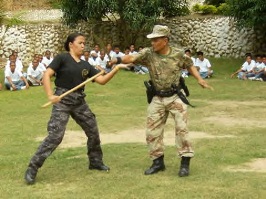
Grandmaster Tortal, we call him “Nene” as he is known, almost every year goes to the USA to give a series of seminars to his students. You can check the details from his web site www.dtskali.com .
I become a proud student of grandmaster in 1998 in Manila while I was living in the Philippines. He is also my Godfather and accepted me as a lifelong student.
A small selected group of students and friends, we could train day and night where ever we found an empty spot. This could be an open empty car park (at nights) site in the middle of Makati City, a seaside spot along Roxas Boulevard in Manila and also our usual training hall. It was important for us that once we got hold of grandmaster, he trained us. I don’t recall him turning us down for any reason if he was available he always comes along and we enjoyed his company immensely.
We travelled to events for demonstrations, trained young people at the universities and enjoyed every bit of it.
The Dekiti-Tirsia Siradas System is an ancient Filipino combat and survival system indigenous to the island of Negros in the Visayan Region of the Philippines. This fighting art is very combative with emphasis on impact and bladed weapons as well as empty hand techniques and even firearms. It has been proven effective many times in actual combat. The name of the system consists of three words from the Ilonggo dialect. Dekiti translated into the Tagalog dialect is “Malapit” of “Dekit”. In English it means very close or near. Its emphasis is on close-quarter fighting in which you corner the opponent in an area, to close and devastate him. Tirsia means “gua sa wala” or “sa tuo” or quartering in fighting, “pasulod”. It means to push the enemy to a corner or an area with a three-corner side preventing him from escaping or running away from multiple deadly blows and thrusts. Siradas means to stop your opponent from getting in or out, for the opponent not to be able to penetrate in any angle of attack.

Dekiti-Tirsia Siradas is the family combat and survival system of the Tortal Clan. Its founder Matahari Tuhon Balbino Tortal learned kali from his father Segundito Tortal and grandfather Norberto Tortal. It was created from the combined expertise of the Tortal brothers, Conrado, Balbino and Francisco It was passed on to them by their father Segundito Tortal and grandfather Norberto Tortal. Conrado Tortal was assigned as Chief of Police of Victorias, Negros Occidental, Philippines during the Commonwealth Period. Victorias was a sugar plantation town and there were very frequent skirmishes among the Sacadas (sugarcane workers). Using their Espading (a straight, very sharp, medium length, a flat and thin blade used to cut sugarcane), they would attack rival Sacadas and even the police. Being in charge of peacekeeping, Conrado Tortal frequently relied on Kali to protect lives.
Don Gregorio Araneta from Bago City, Negros Occidental invited the famous and the number one bastonero from Panay Island, Tansiong Padilla of Iloilo to a match against brother Conrado Tortal, the elder of Balbino Tortal. The match was held publicly during the fiesta of Bago City. The rule was to have both fighters stand on coconut shells and their weapons (stick and dagger) covered with charcoal dust. Anyone marked or stained with charcoal on their shirt will lose. But Conrado was an expert in close-quarter knife fighting. He threw an unconventional daga or dagger method of attack that shocked his opponent. Padilla froze for a couple of seconds giving Conrado an opportunity to penetrate. Conrado successfully penetrated the opponent’s defence causing Padilla to lose the match.
Balbino Tortal, younger brother of Conrado Tortal and father of Grand Tuhon Jerson Tortal Sr, was a member of the National Volunteer Citizens Army. Before the dark clouds of World War II loomed over the Far East, Philippine Commonwealth President Manuel L. Quezon, proclaimed the National Volunteer Citizens Army as a response to the growing threat of invasion by the Japanese Imperial Army. One very important and significant event took place at the closing of World War II. When Balbino Tortal and his family move to the town of Talisay, Negros Occidental, they encountered a group of Japanese soldiers.
The family stopped then the soldiers took Balbino away. But his son Jerson Sr. still accompanied him. The Japanese officer ordered Balbino to be killed. A soldier thrust his bayonet but Balbino sidestepped and evaded it. The officer drew his katana (Samurai Sword) and attacked but Balbino disarmed him and used the katana to attack him and rest the soldiers killing many of them. Unfortunately during the fight, Balbino Tortal was trapped among coconut trunks and then shot. Jerson was also attacked but fortunately slid down a deep ravine where the soldiers could not find him.
The rest of the family escaped to safety because of the heroism of Balbino Tortal. Grandmaster Jerson Tortal Sr. was born on June 13, 1937. Fondly called “Nene ” (Nene was the common nickname for a little girl in the Philippines) because of his small stature, “Nene” Tortal was determined to becoming one of the legendary grandmasters of Kali. He started his training early at the tender age of seven by his father Balbino Tortal and later by his uncles Conrado and Francisco. Even as a child, Jerson Tortal Sr. fought courageously for his country. During World War II, he accompanied his father, Balbino Tortal, a guerrilla fighter to the many meetings of the Crusader Army, an underground resistance movement against the Japanese Imperial Army on Negros Island. Being a small child, the Japanese did not suspect Jerson performed intelligence for the Crusader Army. He played near the Japanese garrison and befriended them by exchanging wild tomatoes for sugar, all the while gathering information for the underground resistance. “Nene” Tortal stood by his father to the last minute as they fought the Japanese.
Isa Alemdag
Tanyu (Sayokan, 7th SAN)
Guro (DTS KALI)
Grand Tuhon, Jerson Tortal Jr. Is planning on conducting seminars throughout the United States and Europe once covid is under control.
Suggested to the owners of their schools or places of practice is setting up an industrial size ozone generator running at night to destroy all viruses and diseases that may be a potential hazard. In doing so, will instill a sense of safety, security, confidence and trust in prospective customers thus boosting clientel.